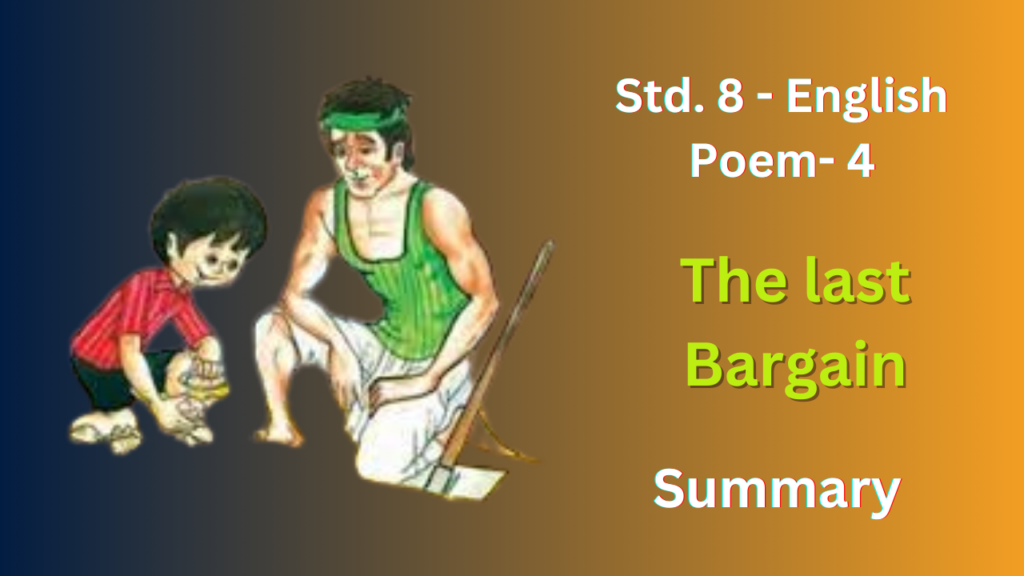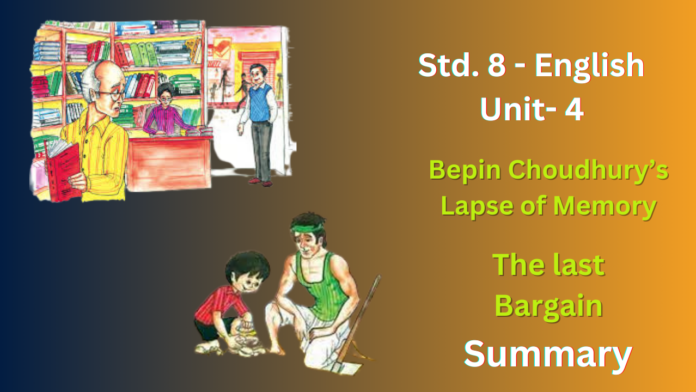NCERT Solutions for Class 8 English Chapter 4
Bepin Choudhury’s Lapse of Memory
Here’s a summary of the chapter “Bepin Choudhurys Lapse of Memory” from your 8th-standard English subject:
The Mystery:
- Bepin Choudhury, a book-loving man, visits a bookstore as usual.
- A stranger, Parimal Ghose, approaches him, claiming they met in Ranchi seven years ago.
- Bepin is utterly confused; he doesn’t remember any trip to Ranchi.
The Confusion Deepens:
- Parimal reveals details about Bepin’s life – his wife’s death, his brother’s insanity – which are true.
- Bepin insists he was in Kanpur during the time Parimal claims they were in Ranchi.
- He tries to contact his friend Haridas, who could verify his whereabouts, but learns Haridas has left the country.
Chunilal and the Revelation:
- A man named Chunilal, whom Bepin had refused a job earlier, arrives seeking help.
- Bepin suspects Chunilal might remember something about Ranchi, but avoids him.
- However, Chunilal faints, and Bepin takes him in, where Chunilal reveals the truth.
The Trick:
- Chunilal confesses that he, along with Parimal, played a prank on Bepin.
- They knew details about him from Bepin’s own conversations and used them to convince him of a fake trip.
- Bepin faints upon realizing he was tricked.
The Aftermath:
- The chapter ends without revealing Bepin’s reaction to the prank.
- We can imagine he might be angry or embarrassed, but the focus remains on the clever prank itself.
Themes:
- The story explores the power of memory and the ease with which it can be manipulated.
- It also touches upon the importance of verifying information before jumping to conclusions.

Comprehension Check
1. Why did the man stare at Bepin Babu’s is disbelief?
Ans : The man, Parimal Ghose, stared at Bepin Babu in disbelief because Bepin denied remembering their supposed trip to Ranchi together seven years ago.
2. Where did Bepin Babu say he went in October’ 58?
Ans : Bepin Babu said he spent the Durga Puja holidays in October 1958 with a friend in Kanpur.
3. Mention any three (or more) things that Parimal Ghose knew about Bepin Babu.
Ans : Parimal Ghose knew that Bepin Babu’s wife was dead, and his only brother had died in the same year in a Ranchi lunatic asylum. He also knew that Bepin Babu had no children and he was a lover of books.
Comprehension Check
1. Why did Bepin Babu worry about what Parimal Ghose had said?
Ans : Bepin Babu was startled to hear Parimal Ghose recount intimate details about his life. There seemed no reason for Parimal to lie. Bepin began to wonder if he truly had forgotten his trip to Ranchi.
2. How did he try to decide who was right— his memory or Parimal Ghose?
Ans : To resolve the puzzle about his visit to Ranchi, Bepin Babu decided to contact Dinesh Mukerji, as Parimal had mentioned that Mukerji was also in Ranchi at that time.
3. Why did Bepin Babu hesitate to visit Mr. Mukerji? Why did he finally decide to phone him?
Ans : Bepin Babu feared Mr. Mukerji’s sharp wit if the Ranchi trip was a lie, and his own memory lapse made him unsure. A phone call felt like a less embarrassing way to confirm the truth.
4. What did Mr. Mukerji say? Did it comfort Bepin Babu, or add to his worries?
Ans : Mr. Mukerji, after consulting his diary, confirmed that he and Bepin Babu had indeed gone to Ranchi in October of 1958. This did not comfort Bepin Babu, but rather added to his worries. The fact that he completely forgot about the trip caused him more concern about his memory.
Comprehension Check
1. Who was Chunilal? What did he want from Bepin Babu?
Ans : Chunilal was an old friend of Bepin Babu who sought a favor from him regarding his job.
2. Why was Dr. Chanda puzzled? What was unusual about Bepin Babu’s loss of memory?
Ans : Paresh Chanda, a young physician who had never encountered a case of memory loss, was puzzled. He suggested to Bepin Babu that he visit Ranchi again.
Comprehension Check
1. Had Bepin Babu really lost his memory and forgotten all about a trip to Ranchi?
Ans : No, Bepin Babu did not actually lose his memory about the trip to Ranchi. The story, “Bepin Choudhury’s Lapse of Memory” by Satyajit Ray, reveals that he was convinced he hadn’t been there.
2. Why do you think Chunilal did what he did? Chunilal says he has no money; what is it that he does have?
Ans : Chunilal, in need of money, sought help from his old friend Bepin Babu. He assured Bepin that his fortune would soon return. Though Chunilal had no money, he possessed both intellect and wit.
Working With the Text
1. The author describes Bepin Babu as a serious and hardworking man. What evidence can you find in the story to support this?
Ans : Bepin Babu was a serious, honest, and hardworking individual who went to the office regularly and performed a responsible job. Not being a social person, he avoided idle chatter and focused on his work.
2. Why did Bepin Babu change his mind about meeting Chunilal? What was the result of this meeting?
Ans : Bepin Babu hoped Chunilal could jog his memory about a trip to Ranchi. The meeting worsened his confusion, as Chunilal claimed to have booked the trip, not Bepin Babu.
3. Bepin Babu lost consciousness at Hundroo Falls. What do you think was the reason for this?
Ans : Bepin Babu’s faint could be due to a physical slip at the falls, or the emotional strain of his memory loss triggered by the location.
4. How do you think Bepin Babu reacted when he found out that Chunilal had tricked him?
Ans : Bepin Babu’s initial reaction was one of regret for not helping Chunilal. He realized Chunilal’s trick was a test and learned a valuable lesson from it.
Working With Language
1. Look at these two sentences.
- He had to buy at least five books to last him through the week.
- Bepin had to ask Chuni to leave.
Had to is used to show that it was very important or necessary for Bepin Babu to do something. He had no choice. We can also use “have to’/ ‘has to’ in the same way.
Fill in the blanks below using ‘had to’/have to’/ ‘has to’.
(i) I _________________ cut my hair every month.
(ii) We _______________ go for swimming lessons last year.
(iii) She_______________ tell the principal the truth.
(iv) They_____________ take the baby to the doctor.
(v) We________________ complain to the police about the noise.
(vi) Romit_________________ finish his homework before he could come out to play.
(vii) I _________________ repair my cycle yesterday. ——————– Bepin Choudhury’s Lapse of Memory
Ans :
(i) have to (This is likely a habit or routine for the speaker.)
(ii) had to (This indicates it was mandatory in the past, but may not be anymore.)
(iii) has to (This emphasizes the importance of telling the truth in this situation.)
(iv) had to (This suggests it was necessary to take the baby to the doctor on a specific occasion.)
(v) might have to (This implies the possibility of complaining, but the decision isn’t final.)
(vi) had to (This shows finishing homework was a requirement before playing.)
(vii) had to (This indicates the repair happened at a specific time in the past.)
2. Here are a few idioms that you will find in the story. Look for them in the dictionary in the following way.
First, arrange them in the order in which you would find them in a dictionary. (Clue: An idiom is usually listed under the first noun, verb, adjective or adverb in it. Ignore articles or prepositions in the idiom). To help you, we have put in bold the word under which you must look for the idiom in the dictionary.)
(i) at/from close quarters (close: adjective)
(ii) break into a smile (break: verb; look under “break into something”)
(iii) carry on (carry: verb)
(iv) have a clean record (you may find related meanings under both these words).
(v) beat about the bush (verb) (verb)
Now refer to your dictionary and find out what they mean.
Ans :
- From nearby
- Smile suddenly
- Continue to Task
- Clean conduct throughout
- To make guess without proper knowledge
3. Study the sentences in the columns below:
| Column A | Column B |
| I saw this movie yesterdayBipin babu worked here for a week last yearChunilal wrote to a publisher last weekI visited Ranchi once , long ago | I have seen this movie yesterdayBepin babu has worked here since 2003Chunilal has written to a publisherI have visited Ranchi once, before |
Compare the sentences in the two columns, especially the verb forms. Answer the following questions about each pair of sentences.
(i) Which column tells us that Bepin Babu is still working at the same place?
(ii) Which column suggests that Chunilal is now waiting for a reply from the publisher?
(iii) Which column suggests that the person still remembers the movie he saw?
(iv) Which column suggests that the experience of visiting Ranchi is still fresh in the speaker’s mind?
Ans :
- Column B
- Column A
- Column A
- Column B
4. Given below are jumbled sentences. Working in groups, rearrange the words in each sentence to form correct sentences.
You will find that each sentence contains an idiomatic expression that you have come across in the lesson. Underline the idiom and write down its meaning. Then use your dictionary to check the meaning. One sentence has been worked out for you as an example.
Jumbled sentence: vanished/The car/seemed to/into thin/have/air
Ans :
The car seemed to have vanished into thin air.
- Meaning: Disappeared completely and mysteriously.
(i) Stop/and tell me/beating about/what you want/the bush.
Ans : Stop beating about the bush and tell me what you want.
- Meaning: To avoid getting to the point of an issue, to speak indirectly.
(ii) don’t pay/if you/attention/you might/the wrong train/to the announcement/ board.
Ans : If you don’t pay attention to the announcement board, you might board the wrong train.
- Meaning: To listen carefully, to be mindful of important information to avoid mistakes.
(iii) The villagers/tried/the crime/on the young woman/to pin.
Ans : The villagers tried to pin the crime on the young woman.
- Meaning: To blame someone falsely for a crime or wrongdoing.
(iv) Bepin Babu/orders to/telling people/under/loved/doctor’s/eat early/that he was.
Ans : Bepin Babu loved telling people that he was under doctor’s orders to eat early.(The sentence is already grammatically correct, it just needs rearranging for better flow:)
(v) the students/The teacher/his eyebrows/when/said that/all their lessons/ raised/they had revised.
Ans : The teacher raised his eyebrows when the students said they had revised all their lessons.
- Meaning: This sentence doesn’t contain a traditional idiom, but it uses a common expression – “raised his eyebrows.” This implies non-verbal communication, suggesting the teacher was surprised, doubtful, or skeptical of the students’ claim.
Speaking and Writing
1. What do you think happened after Bepin Babu came to know the truth?
Was he angry with this friend for playing such a trick on him? Or do you think he decided to help a friend in need?
Ans : Bepin Babu likely feels a mix of relief (no memory loss!), maybe some anger at the prank, but ultimately understanding and perhaps even guilt for not helping his friend. The story leaves his final reaction open to interpretation.
2. Imagine you are Bepin Choudhury. You have received Chunilal’s letter and feel ashamed that you did not bother to help an old friend down on his luck. Now you want to do something for him. Write a letter to Chunilal promising to help him soon.
Or
A prank is a childish trick. Do you remember any incident when someone played a prank on you or your friends? Describe the prank in a paragraph.
Ans :
My Dearest Chunilal,
Forgive me, my friend. Your letter shook me more than you could imagine. Not because of the “memory lapse,” though that was certainly a shock! But because I, your old friend Bepin, failed to see your true need hidden beneath the playful facade.
Shame washes over me for not recognizing your struggle. Please know that the elaborate charade, however unsettling, has opened my eyes. I am so very sorry I did not offer help when you truly needed it.
Consider this a promise, Chunilal. I will be there for you soon. Tell me what you require, and I will do everything in my honest power to assist you. Let us put this memory lapse behind us and rebuild a stronger friendship, one built on genuine support.
Your friend, with sincere apologies,
Bepin Choudhury
The last Bargain
The poem “The Last Bargain” by Rabindranath Tagore tells the story of a man searching for a job. However, this job must come with a key condition: he doesn’t want to lose his freedom.
The man encounters various tempting offers:
- A king proposes power, but the man finds it fleeting.
- A wealthy man offers riches, but the man sees them as hollow.
- A beautiful woman offers a smile, but the man realizes it masks sadness.
He rejects all these offers because they come with a loss of freedom. Finally, he meets a child who simply asks him to work without any promises or rewards. The man readily accepts, finding true freedom in a job without strings attached.
Key Takeaways:
- True freedom is more valuable than power, wealth, or beauty.
- The man prioritizes his independence over material gain or superficial appearances.
- The child’s offer symbolizes the purity of work without manipulation or control.

Working With the Poem
1. Who is the speaker in the poem?
Ans : In the poem “The Last Bargain,” the speaker is a man who is searching for a job. The poem focuses on his journey to find work that allows him to retain his freedom.
2. “The king, sword in hand” suggests
(i) wealth (ii) power (iii) more power than wealth
Mark the appropriate item in the context of stanza 1.
Ans :
(ii) power
Here’s why:
- The king arrives in a chariot, a symbol of power and status.
- He carries a sword, another symbol of authority and power.
- He offers to hire the man with his power, not his wealth.
3. The old man offered the speaker a lot of money. Why did he turn down the offer?
Ans : The speaker in “The Last Bargain” rejected the money because he valued freedom over wealth and likely suspected the work wouldn’t last.
4. Find in the poem, lines that match the following. Read both one after another.
(i) I have nothing to give you except goodwill & cheer.
Ans : “hire you with nothing”
(ii) Her happiness was no more than sorrow in disguise.
Ans : “melted into tears”
(iii) The king’s might was not worth much.
Ans : But his power counted for naught
5. How did the speaker feel after talking to the child on the beach?Ans : After talking to the child, the speaker likely felt free and content. The job offer had no strings attached and offered a sense of joy and purpose.
FAQ’s
What is “Bepin Choudhurys Lapse of Memory” about in Class 8 English Chapter 4?
“Bepin Choudhurys Lapse of Memory” is a humorous story about Bepin Choudhury, who starts doubting his memory when a stranger insists he had an adventure in Ranchi, which he cannot remember. It explores themes of memory, deception, and self-doubt.
What is the main theme of “The Last Bargain” in Class 8 English Chapter 4?
The main theme of “The Last Bargain” is the search for true happiness and fulfillment. The poem illustrates that wealth, power, and beauty do not bring true happiness; instead, genuine satisfaction is found in simple, honest relationships and experiences.
How does Bepin Choudhury’s character develop in “Bepin Choudhurys Lapse of Memory” from Class 8 English Chapter 4?
Bepin Choudhury’s character develops from being a confident and self-assured man to one filled with doubt and confusion about his own memory. His experience teaches him humility and the importance of verifying facts before drawing conclusions.
What lesson can students learn from “Bepin Choudhurys Lapse of Memory” in Class 8 English Chapter 4?
Students can learn about the fallibility of human memory, the impact of deceit, and the importance of self-awareness. The story also highlights the humorous side of human nature and the importance of not taking oneself too seriously.
How does the setting contribute to the story “Bepin Choudhury’s Lapse of Memory” in Class 8 English Chapter 4?
The setting of Kolkata and the mention of Ranchi play crucial roles in creating the backdrop for Bepin Choudhury’s confusion. The familiar urban environment contrasts with the supposed memory of an unfamiliar place, heightening his sense of disorientation.
How does “The Last Bargain” from Class 8 English Chapter 4 depict the search for happiness?
The poem depicts the search for happiness through the protagonist’s encounters with wealth, power, and beauty, all of which fail to satisfy him. Eventually, he finds happiness in the simplicity of a child’s companionship, highlighting that true joy comes from within.
What role does deception play in “Bepin Choudhury’s Lapse of Memory” in Class 8 English Chapter 4?
Deception plays a central role in the story, as Bepin Choudhury is tricked into believing he has lost his memory. This deception causes him significant distress and leads to a deeper understanding of his vulnerability and the reliability of his recollections.
What literary devices are used in “The Last Bargain” to convey its message in Class 8 English Chapter 4?
“The Last Bargain” uses metaphors, personification, and imagery to convey its message about the true nature of happiness and fulfillment. The poem’s simplicity and directness highlight the contrast between material wealth and genuine contentment.


